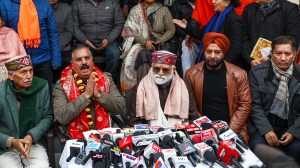Sonia, the inner voice and Gandhi
If she was so unselfish, why didn8217;t she declare much earlier that she was not interested in the Premiership?As far as I can see, Sonia ...

If she was so unselfish, why didn8217;t she declare much earlier that she was not interested in the Premiership?
As far as I can see, Sonia Gandhi has not claimed a non-human selflessness in declining the nation8217;s most powerful office. She only said that she heeded her inner voice and conscience, and also that as far as she could judge this was a wise decision.
Yes, she did not reject, during the campaign or immediately thereafter, the possibility of her becoming premier. While not rejecting that possibility, she later turned down an opportunity presented in extremely favourable circumstances, with much of the country, many of those earlier opposed to her, and most allies joining the Congress in asking for her premiership.
She turned down the opportunity firmly and gently. If the nation has widely honoured her for this rejection, it is because the opposite of what she did is more common: To seize an opportunity of high office after loudly rejecting the idea when it was only a remote possibility. She is not asking to be honoured for saintly virtues, but the wisdom of her step is already clear. For one thing, it has made Manmohan Singh prime minister, thereby restoring Sikh self-respect, the damage to which has been costly to India, an outcome more important than the restoration of share prices.
Also, Sonia has suggested that she was troubled that her becoming prime minister might be turned into a pretext for spreading hate and spilling blood all over again. Her saying no removed that possibility.Whether or not her decision was proof of a rare nobility, it seems thus to have been wise. Perhaps more evidence of its wisdom will become available in course of time. Although it is likely that Sonia anticipated some positive results from her decision, we should be open to her claim that she was guided above all by her inner voice.
8220;You speak of your inner voice, but what about the inner voices of millions who want you to become prime minister?8221; I can think of one answer to the question that was hurled at her by many Congress MPs. If the inner voice is a whisper, albeit an insistent whisper, of the spirit, the result of heeding it is calm, not agitation. Those of us who watched Sonia Gandhi on TV carried away an impression of a woman at peace, whereas the Congress MPs urging her to change her mind seemed greatly worked up. They were presenting their strong feelings to her, not necessarily the whispers of their inner voices. These feelings are not necessarily selfish, but perhaps they were not the outcome of a quiet seeking of the inner voice.
Those like me who by age and/or study are linked to an earlier era are aware of the Mahatma8217;s references to the inner voice, some of which can be found in his Autobiography that work takes his story only to about 1919. He invoked the inner voice again in 1922, when, following the Chauri Chara killings, he called off a nationwide movement; in 1932, when he went on a fast over separate electorates for the Dalits; in 1942, when he launched Quit India, and in January 1948, when he fasted for Hindu-Muslim reconciliation.
To those interested I commend a study of these and other incidents in Gandhi8217;s life. I may however mention some aspects of the decisions that Gandhi claimed were linked to his inner voice. One, a lot of thought and reasoning accompanied Gandhi8217;s search for the inner voice. In questing for what might be best for the national movment and the nation, he turned to his mind and conscience both. Two, after heeding his inner voice towards a difficult decision, Gandhi almost always claimed that he felt at peace, and he seemed to convey a sense of calm. Three, though the first reactions of his colleagues to such decisions were often of bewilderment and disagreement, their later conclusions were generally of an opposite kind. This was true over Chauri Chaura, the 1932 fast, Quit India, and the 1948 fast.
Gandhi never claimed that he was anything other than an ordinary human being. But rank or office held no charm for him. His goal was to enhance his colleagues and India8217;s weakest human beings. This concern for others and a lack of concern for himself may have helped his ability to hear the inner voice.
Here I cannot resist mentioning what happened at the end of 1929. This was when Gandhi was elected Congress president for the second time. He had served as Congress president in 1924-5. Turning down the honour in 1929, Gandhi recommended Jawaharlal Nehru, who as a result presided 8212; at the age of 40 8212; at the historic Lahore Congress on the banks of the Ravi.Referring, when he renounced the presidentship, to Nehru, Gandhi said, 8220;The nation is safe in his hands.8221; Does that sound familiar?
The writer is Gandhiji8217;s grandson and author of 8216;Revenge and Reconciliation: Understanding South Asian History8217;
- 01
- 02
- 03
- 04
- 05































